JFK anniversary: The myth and reality
- Published
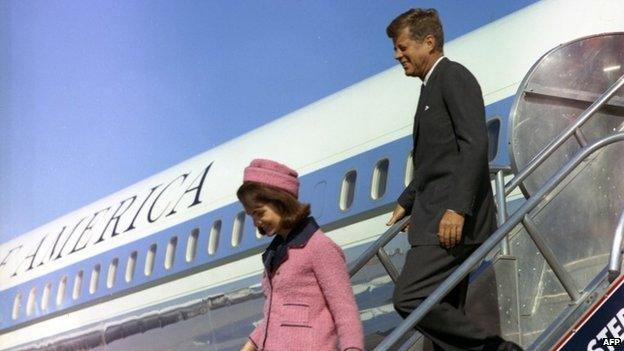
The assassination of John F Kennedy means that we all get to decide how his story should have ended, and thus plot an alternative trajectory for the country he so fleetingly led. The events in Dallas exactly 50 years ago made JFK as much a myth as a man, one of history's most endlessly malleable figures.
He was a politician "cut down in his prime", in the words of the well-worn narrative, whom Americans and others around the world could mould into the president they yearned him to be.
For those who continue to idolise him, he is the charismatic leader, tempered by his personal experience of war, who would have extricated America from the horror of Vietnam. The liberal-minded reformer who would have dismantled segregation and repaired the country's racial breach. The visionary who might have saved America from the long national nightmare of Watergate, and also its central villain, Richard Nixon, whom he had defeated in the 1960 election.
For them, the wounds of Dallas have yet to heal.
To his detractors, however, Kennedy was a playboy president, who enlarged America's involvement in Vietnam, regarded civil rights cynically as a political problem to manage rather than a moral issue to champion and whose presidency is almost as noteworthy for its 1,000 nights as its 1,000 days.
Neurosurgeon Robert Grossman: "I saw the president dying in front of my eyes"
Perhaps Dallas even saved him from a lifetime of tawdry tabloid headlines, and the lurid details being made public of his affairs with Hollywood starlets, like Marilyn Monroe, and the Mafia moll, Judith Campbell Exner.
Killed at the age of just 46, having become America's youngest elected president less than three years earlier, few other historical figures have attracted so many "what ifs".
Consider the black-and-white photo (below) that emerged during the 1992 presidential campaign, which showed the young Bill Clinton meeting Kennedy on the lawns of the White House in 1963.
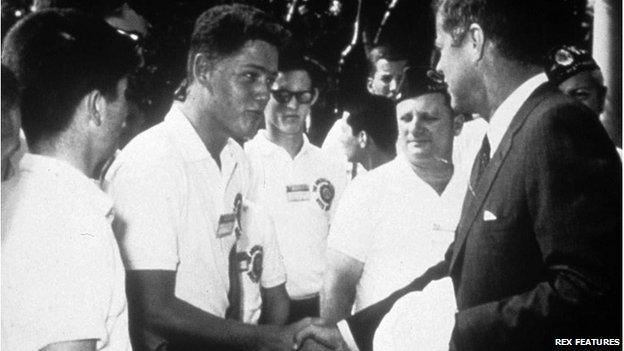
It was a huge boon for the Clinton campaign, for it looked almost as if Kennedy was handing the torch to the next generation of Democratic leaders, and that the Arkansan's success was somehow preordained.
But in the 1995 novel Idlewild, the name of New York's international airport before it became a memorial to the slain president, the author Mark Lawson imagined an alternate history. With Kennedy and Marilyn Monroe living to see old age, the Clinton campaign tries its damnedest to suppress the photo out of fear of associating their candidate with a disgraced former president.
Certainly, it is hard to visualise Kennedy as a presidential pensioner. And given our rapacious appetite for scandal, he would unquestionably have become the target of character assassins in the media - a far cry from the early 60s when his peccadilloes went unreported.
Leaving aside the counter-factuals, even the facts of Kennedy's career are widely misunderstood.
His victory in the 1960 presidential election was not contingent on the phantom ballots of dead voters in Chicago spirited up by the city's then mayor Richard J Daley. Kennedy would have beaten Vice-President Richard Nixon even without Illinois in his column.
It is also worth remembering that the polls suggested strongly that President Dwight Eisenhower would easily have won a third term had not the US constitution restricted him to two.
It pained Kennedy that he did not beat Nixon more convincingly - his hair's breadth victory margin in the popular vote was just 112,827 votes - and that the electorate did not love him more.
Back then, Kennedy was not regarded as a passionate liberal. Nor did he ever become one.
Rather, he was a calculating pragmatist, famed for his cool detachment and emotional aloofness, who tried to straddle the divide which then existed in the Democratic party between northern progressives and southern segregationists.
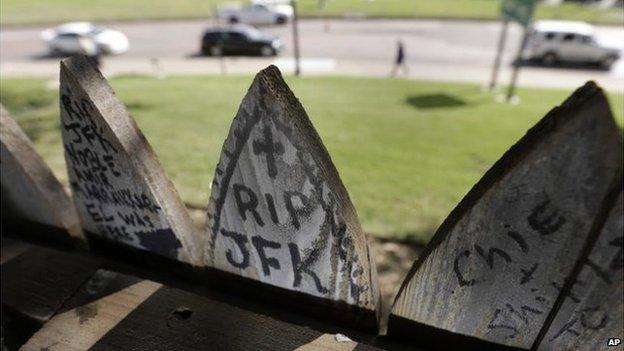
When southerners backed his bid to become the vice-presidential nominee at the 1956 Democratic convention, Kennedy said that for the rest of his life he'd be singing "Dixie", a great anthem of the states of the old Confederate south where segregation still prevailed.
When Lyndon Johnson emerged as his main rival for the Democratic presidential nomination in 1960, he positioned himself as more of a reformer. From his first run for office in 1946 to his last in 1960, he did whatever was politically necessary to win.
Colleagues on Capitol Hill, where Kennedy had served for 14 years as a congressman and senator, regarded him as wholly unqualified for the presidency. Lyndon Johnson, the famed Master of the Senate, was especially withering, describing his junior colleague as a "young whippersnapper, malaria-ridden and yellow, sickly, sickly".
Eleanor Roosevelt, FDR's widow, regarded him as a lightweight, an apologist for Joe McCarthy, the head of the communist witch-hunt, and a stooge of his father, Joe Kennedy.
The New Frontier, rather than being a carefully thought-out programme, was a slogan designed to revive memories of the New Deal. JFK was no FDR. But it is the style of the Kennedy years that we recall as much as their substance.
JFK's Camelot - a phrase shrewdly introduced by Jackie Kennedy in her first interview after her husband's death - was staggeringly beautiful, and more than met the visual demands of the television age. After Harry Truman and Eisenhower, the Kennedys brought some much-needed glamour to the White House.
Partly because of his celebrity and youth, Kennedy is seen as the leader who ushered in American modernity.
But much of his modern-day appeal is explained by the fact that he also recalls a more innocent time: the post-war, pre-Dallas phase when America was animated by a sense of possibility before the pessimism of the late-Sixties and Seventies took hold.
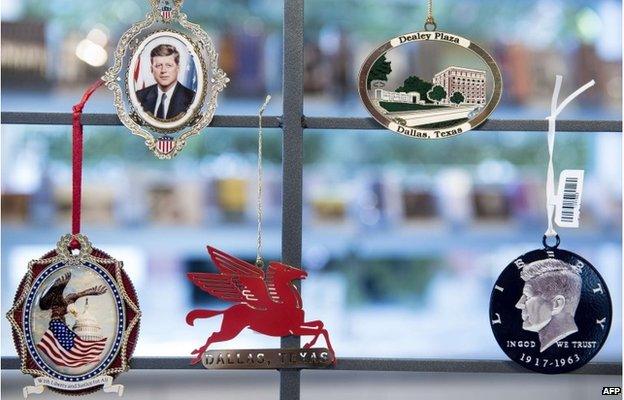
It was also a less violent time, of course, when US presidents could still be driven through the streets of even hostile cities in an open-top limousine. Multiple shootings were a rarity. Most Americans would not have understood what was meant by the term "terrorism."
Scholars have not been so easily seduced by the style and iconography of the Kennedy years. Indeed, with no other president is there such a wide discrepancy between his public and academic reputation. In terms of domestic legislation, his record of achievement was relatively meagre.
On civil rights, he was a bystander for the first two-and-half years of his presidency, and had never wanted to lead the great social revolution of his age because he feared it would split the Democratic Party. His reckless womanising unquestionably distracted him from the affairs of state.
Having boosted America's involvement in Vietnam in the early part of his presidency, he called for a reduction in the number of military advisors before his death. But we simply do not know whether this would have led to a wider withdrawal or whether he would have escalated the war.
Kennedy, after all, was a Cold Warrior who had promised that America would bear any cost in its defence of freedom.
Nikita Khrushchev, who regarded him as a novice, also needled. Unimpressed with Kennedy at their first summit meeting in Vienna in 1961, and also the botched handling of the Bay of Pigs debacle the same year, the Soviets were emboldened to build the Berlin Wall and position nuclear warheads in Cuba.
Kennedy's speeches could be brilliant, and inspired thousands to enter public service, not just in America but also around the world. That may be his greatest legacy, hard though it is to measure.
His inaugural address, where he challenged Americans not to ask what the country could do for them but what they could do for their country, ranks amongst the best. He is one of the few US presidents most of us can quote, even if it is just four words: "Ich bin ein Berliner."
At times, however, his rhetoric was considered inadequate. James Meredith, whose determination to register as the first black student at University of Mississippi led to one of the climactic battles of the civil rights era, submitted his application in anger at Kennedy's failure during his inaugural address to denounce the evil of segregation.
The creation of the Peace Corps. The Nuclear Test Ban Treaty. The space programme. The peaceful resolution of the Cuban Missile crisis, when the world came perilously close to nuclear annihilation. All are positive entries in the historical ledger.
By his time of his death, he was also becoming a more serious and substantial figure - a truly grown-up president.
However, the historical inventory includes major negatives. On healthcare, it took the legislative skills of Lyndon Johnson to enact Medicare providing coverage for the elderly. On civil rights, his early inaction as president led white segregationists to believe they could prolong segregation, and prompted black protesters to adopt more provocative tactics and make more radical demands.
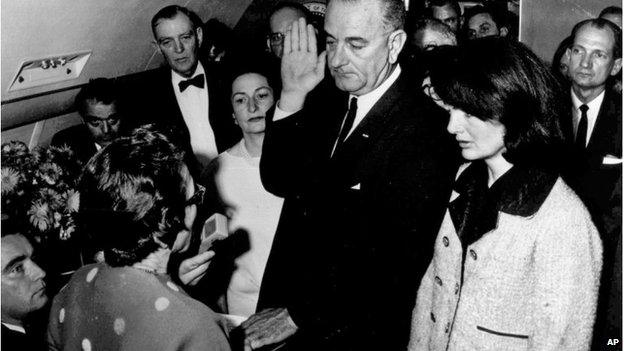
The legislative skills of Lyndon Johnson - sworn in straight after JFK's death - are credited for key reforms
At the beginning of the 60s, a more peaceful transition towards a more equitable society looked possible. By the time of his death, even his promise of the most far-reaching civil rights bill in history could not quell black unrest.
Much of the coverage surrounding the 50th anniversary of his assassination is similar in reverential tone to the period following his death, when eulogies understandably lapsed into idolatry.
But one of the reasons why so many words have been penned - adding to the 40,000 books weighing down library shelves for decades - is because we are still trying to pinpoint the essence of the man.
For all his easy charm, he could be frustratingly enigmatic. Even close friends often found it difficult to divine his true motivations and character. When two of his dearest pals, Kenny O'Donnell and Dave Powers, published a joint memoir, they rather aptly entitled it "Johnny, we hardly knew ye".
In a survey of the Kennedy historiography, external, New York Times editor Jill Abramson complained that, for all the books that have been written, no author has yet produced a superlative biography on JFK, partly because he remains so elusive.
It helps explains his continuing fascination. Fifty years after the trauma of Dallas, we are still trying to evaluate precisely who he was.
In late-1963, as he prepared to seek re-election, my sense is that Kennedy was still in the process of making that determination himself.
Follow @BBCNewsMagazine, external on Twitter and on Facebook, external